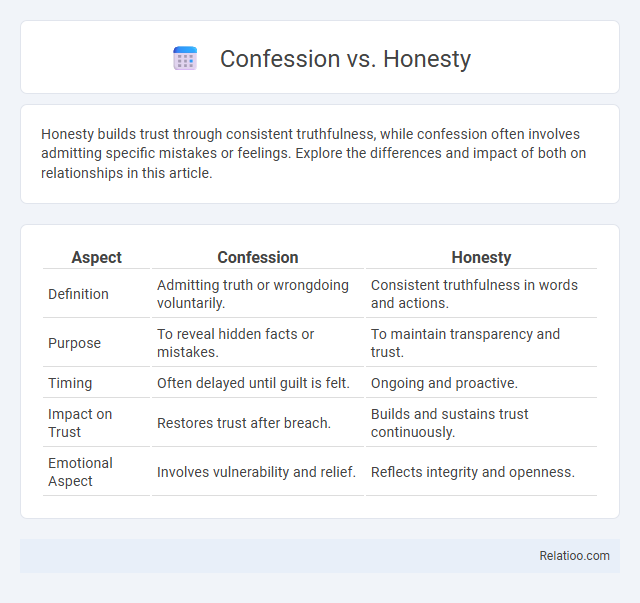Honesty builds trust through consistent truthfulness, while confession often involves admitting specific mistakes or feelings. Explore the differences and impact of both on relationships in this article.
Table of Comparison
| Aspect | Confession | Honesty |
|---|---|---|
| Definition | Admitting truth or wrongdoing voluntarily. | Consistent truthfulness in words and actions. |
| Purpose | To reveal hidden facts or mistakes. | To maintain transparency and trust. |
| Timing | Often delayed until guilt is felt. | Ongoing and proactive. |
| Impact on Trust | Restores trust after breach. | Builds and sustains trust continuously. |
| Emotional Aspect | Involves vulnerability and relief. | Reflects integrity and openness. |
Understanding the Concepts: Confession and Honesty
Confession involves admitting a specific wrongdoing or fault, often in a formal or personal context, while honesty reflects a broader commitment to truthfulness and transparency in thoughts, words, and actions. Understanding confession requires recognizing it as a deliberate disclosure of an action or belief, whereas honesty encompasses a consistent moral value guiding behavior across situations. Both concepts are essential in fostering trust, but honesty represents an ongoing trait, whereas confession is a discrete act, often prompted by circumstances demanding accountability.
Key Differences Between Confession and Honesty
Confession involves voluntarily admitting specific wrongdoings or mistakes, often in a formal or personal context, while honesty refers to consistently telling the truth and being transparent in all situations. Your choice to confess usually implies acknowledgment of guilt or responsibility, whereas honesty encompasses a broader commitment to truthfulness regardless of circumstances. Understanding these key differences helps clarify when you are simply being truthful versus when you are deliberately owning up to a specific fault.
The Role of Intent in Confession vs. Honesty
The role of intent fundamentally distinguishes confession from honesty, as confession involves a deliberate admission of wrongdoing with the purpose of seeking forgiveness or relief, while honesty entails a consistent practice of truthfulness regardless of consequences. Confession is often context-specific and motivated by ethical or social obligations to reveal hidden faults, whereas honesty reflects an intrinsic value guiding transparent communication. Understanding intent clarifies how confession can be a strategic act of accountability, whereas honesty represents a broader commitment to integrity in everyday interactions.
Situational Contexts: When Confession Matters
Confession becomes crucial in legal, therapeutic, or interpersonal situations where revealing truths can lead to resolution or healing. Honesty generally applies to everyday interactions, fostering trust and transparency without necessarily requiring full disclosure. Your choice between confessing and simply being honest depends on the context, consequences, and the need for accountability in that specific scenario.
The Impact of Honesty on Relationships
Honesty fosters trust and deepens emotional connections, playing a crucial role in strengthening relationships. While confession involves revealing specific truths, continuous honesty ensures transparency and reduces misunderstandings with Your partner. Embracing honesty promotes healthier communication, leading to greater intimacy and long-term relationship stability.
Psychological Effects of Confessing vs. Being Honest
Confessing often involves admitting guilt or wrongdoing, leading to relief from guilt and reduced psychological stress by confronting hidden emotions, while honesty promotes trust and strengthens interpersonal relationships through consistent truthfulness. Psychological effects of confessing include anxiety reduction and emotional catharsis, whereas honesty enhances self-esteem and social credibility by aligning actions with personal values. Both confession and honesty contribute to mental well-being but differ in context; confession typically addresses past misdeeds, while honesty fosters ongoing transparency.
Moral and Ethical Perspectives
Confession involves openly admitting wrongdoing, which can promote personal accountability and moral growth, while honesty reflects a broader commitment to truthfulness in all interactions, fostering trust and ethical integrity. Your choice to confess demonstrates courage and a willingness to accept consequences, aligning with principles of ethical responsibility. Both confession and honesty are essential for maintaining moral standards, but confession specifically addresses the acknowledgment of faults, contributing to ethical reconciliation and personal transformation.
Social Consequences of Confession and Honesty
Confession often triggers immediate social consequences such as relief of guilt or judgment from others, impacting trust and relationships dynamically. Honesty, as a consistent behavior, builds long-term social capital and credibility, fostering deeper interpersonal connections and respect. While confession addresses specific past actions, honesty influences ongoing social interactions and community cohesion.
Building Trust: Which Matters More?
Building trust hinges more on honesty than confession, as honesty involves consistently transparent and truthful behavior that fosters reliability over time. Confession, while important for acknowledging mistakes and promoting accountability, is a reactive act that alone may not sustain trust without ongoing honesty. Emphasizing a culture of honesty in relationships or organizations creates a foundation where confessions are welcomed and trust is continually reinforced.
Practical Tips for Navigating Confession and Honesty
Navigating confession and honesty requires understanding that confession involves revealing truths that may be difficult or painful, while honesty is a broader practice of truthfulness in daily life. You can foster trust by choosing appropriate timing, being clear and sincere, and preparing for emotional responses when confessing. Practicing consistent honesty builds a foundation that makes confession less daunting and more constructive in relationships.

Infographic: Confession vs Honesty
 relatioo.com
relatioo.com